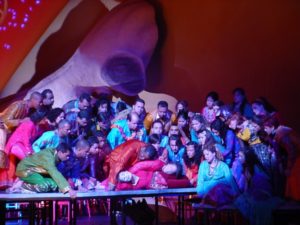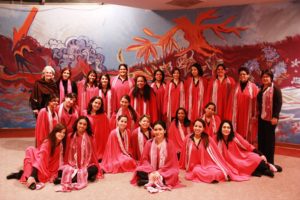A Decade of Choir Success
by Maria Guinand, choral conductor, university professor and leader of many choral projects
Today, our country possesses a vigorous and vibrant musical movement within which the protagonists are fundamentally children and young people. Everywhere across the country we will find an orchestra, a chamber ensemble, a music group or a choir. There is no doubt that the Venezuelans like music a lot, and that it forms part of our daily lives. But this marvelous reality has not been the product of improvisation, a fantasy or simple musical talent. It exists because of a history of visionary men who made great personal and institutional efforts to construct spaces that stimulate, creating a situation that is undoubtedly unique on the continent. Two of these visionaries are José Antonio Abreu (creator of Fundación del Estado para las Orquestas Juveniles e Infantiles de Venezuela – El Sistema, the State Foundation for Children’s and Youth Orchestras of Venezuela – the System, now known as FESNOJIV) and Alberto Grau (founder of Fundación Schola Cantorum de Venezuela – the Venezuela Schola Cantorum Foundation, FSCV), who were both trained in Master Vicente Emilio’s department of composition in the José Angel Lamas School of Music.
While choral singing today occupies an important place within this panorama, there is still a long way to go until we can make this art a regular part of the primary and secondary school system. Today in our country there are many opportunities to get good musical training, both in instrumental performance practice from the Conservatory of Music, and in academic development at undergraduate and graduate level, at various universities. Academic music in Venezuela has grown steadily for more than 40 years, and currently the most important organization, in relation to academic music, is ‘FESNOJIV’. At the choral level, FSCV (www.fundacionscholacantorum.com) is the most recognized internationally. This foundation, a private not-for-profit organization which has been active for 43 years, has always been the choral arm of FESNOJIV symphonic and choral productions since 1975, and has contributed to the growth of its network of choirs by training choral conductors. Apart from the FSCV, there are other private choral foundations which play an important role in promoting choral singing in the country, both in the organization of national and international festivals, and in the area of teaching and training of maestros and the promotion of citizenship activities and value-building values through choral singing. They are Fundación Vinicio Adames, Fundación Julio Villarroel, Fundación D’ Canto, Fundación Gaudeamus, Fundación Aequalis, Fundación Calcaño, Fundación Cantoría de Mérida, Fundación Beatriz Miranda, Fundación Caribe, Fundación Camerata de Caracas.
Currently, the FSCV continues to exercise strong leadership in the achievement of new artistic goals for the groups, staging new repertoires from a cappella literature to choral symphonies, premiering Latin American works, creating new choral works, training directors and maestros, and keeping an international presence across diverse settings. Its actions have transcended our frontiers to the Andean region and into the international sphere. The FSCV has developed a network of mechanisms to make the Venezuelan choral movement one of the most dynamic and well known worldwide, not only for the quality of its groups but also for its organization, perspectives and scope.
The foundation has moved into different fields through its areas of work:
- Teaching (Singing to Build Citizenship Program)
- Dissemination and research (foundation choirs and musical archive)
The Schola Cantorum de Venezuela, following its path of excellence, innovation and the search for new repertoires, has in the last decade appeared at the most important events in the world. The group has premiered, with much success, choral a cappella works by Alberto Grau and other Latin American composers, such as ‘La Pasión según San Marcos’ by Osvaldo Golijov, and the opera ‘A Flowering Tree’ by John Adams, commissioned for the Venice Festival in 2006 on the occasion of the celebration of the Mozart Year. These concerts received exceptional acclaim in the press and have been recorded by the record companies Haenssler Verlag (nominated for the Grammy award and the Grammy Latino in 2002), Nonesuch and Deutsche Grammophon. These achievements, milestones in Latin American choral history, have been accompanied by successes on the most important stages in the world, amongst others the Lincoln Center (New York, USA), Disney Hall (Los Angeles, USA), Sydney Opera House (Sydney, Australia), Barbican Centre (London, England) and Casa de la Música (Oporto, Portugal). There is no doubt that the national and international trajectory of the Schola Cantorum de Venezuela has been the most successful in this country and in Latin America, this century.
In 1976, the Cantoría Alberto Grau was created within the Fundación Schola Cantorum as a female vocal group working to train young female singers and choral directors. It is the first female voice choir in the country with an enviable national and international reputation, and it acted as a role model for the formation of other similar groups such as Aequalis Aurea directed by Ana María, Ludus Vocaliter directed by Lourdes Sánchez, and Canticum Merú directed by Irma Iorio, all of which are today well known nationally and internationally.
The Schola Juvenil de Venezuela, directed by Luimar Arismendi, was founded in 2006. It is a choir of young people between the ages of 12 and 18 and comes out of the program Construir Cantando (Singing to Build Citizenship) program, which addresses the need to promote musical education in all of Venezuela, with special emphasis placed on youngsters of limited financial resources. It responds to the limitless possibilities of choral singing as an effective tool for social development and the formation of values. It also allows for both the training of young choristers in the Pequeños Cantores centers (Little Singers), and for the creation of a new generation of choral directors. There are currently 18 Pequeños Cantores centers located in the city of Caracas and in the states of Mérida, Miranda, Trujillo and Bolivar, and they are attended by about 1800 children and young people. The Schola Cantorum de Venezuela Foundation has also encouraged the creation of a choral music archive, which is currently the largest in the country.
In the last four years FESNOJIV has given great impetus to the choral movement, developing a network of choirs called Coros Sinfónicos Juveniles (Youth Symphony Choirs), and these cover the states of Tachira, Merida, Zulia, Lara, Carabobo, Aragua, Miranda, Distrito Capital and Guarico. The longest-running groups operate under the auspices of the ‘Camerata Larense’ founded in 1987 by Libya Gomez, which has six choirs and promotes a wide network of children’s choirs, among them the ‘Coro Sinfónico de Aragua’ directed by Iraida Pineda and the ‘Coro Sinfónico Metropolitano’ directed by Lourdes Sánchez. Also, in all its nuclei, FESNOJIV is developing an extensive network of children’s choirs called ‘Niños Cantores’ (Child Singers) who begin music through choral singing.
The 21st century has begun with a great deal of vitality in music and choral work. Our country has an extraordinary future in the development of this discipline, and it will certainly contribute in a profound and substantive way to the consolidation of the foundations of a more humane, civic, democratic and truly integrated society.
Translated from the Spanish by Martin Clarke

